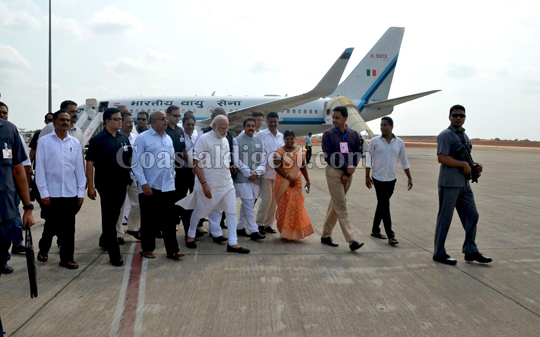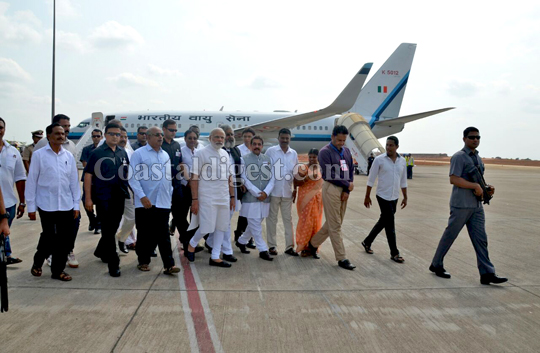Mangaluru, May 8: Prime Minister Narendra Modi on Sunday morning landed at Mangaluru International Airport amidst tight security to take part in election campaign in poll bound-Kerala.

Deputy Commissioner AB Ibrahim formally welcomed the PM in the presence of a few local dignitaries at the airport soon after the latter emerged from an Indian Air Force special flight.
Mangaluru City Police chief M Chandra Sekhar, former district-in-charge minister Krishna J Palemar, educationist Ganesh Rao, former MLA Yogish Bhat, deputy mayor Sumitra were present on the occasion.
No politician from ruling Congress party of the state, including Dakshina Kannada district-in-charge minister B Ramanath Rai were present to welcome Mr Modi, as the intention of latter's visit was BJP's poll campaign.
Mr Modi will be addressing three public meetings today, starting off from Kasaragod, followed by Kuttanad in Alapuzha district, and Thiruvananthapuram.







Comments
Y So serious Modiji?????
'Haraka baraka 'means if we make movements it will increase something or it will give fruit. He is moving ,struggling , let other parties move even they will get some fruit.
Yes congress leaders will meet at beef dinner party....
Mr.Ibrahim no need bend yourself in front of PM or any human being. Learn from PC.
WOW! Came to distribute 15 Lakhs Rupees!
vikaas ka bakwaas......please translate it in malayalam......
sawaa sau karod hindustaani.....same bla bla bla.....
Kerala BJP , this time please arrange a good translator for Modi, last time it was a big joke. We are already tired of watching Modi's hundreds of jokes.
Shri Modi Ji will improve BJP's chances.Good Luck.BJP may get more seats in RS,which it needs very much.
Shri Modi Ji will lead BJP to a better performance with his Electrifying and thunderous Speeches
Thiruvanantapuram is super excited to welcome PM narendramodi.
welcome modiji,.
Ramanath Rai may meet in the dinner party
Add new comment